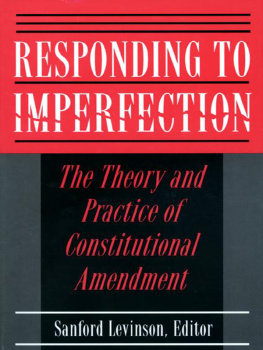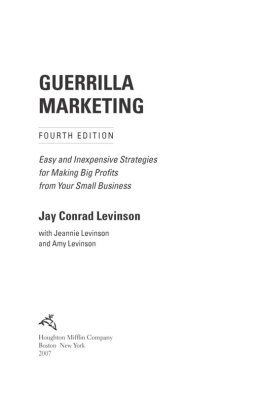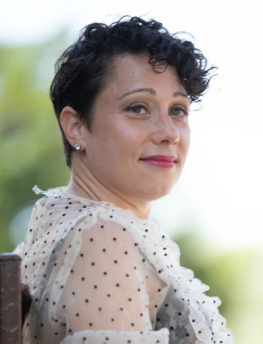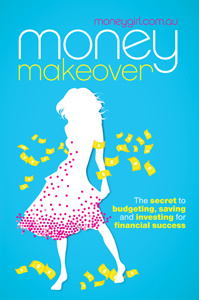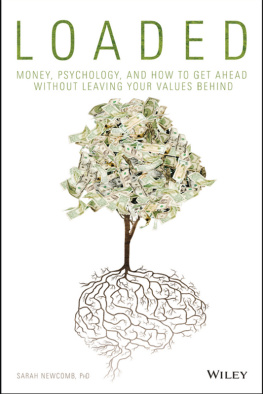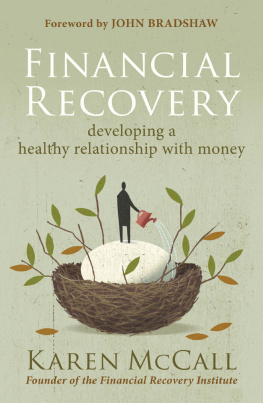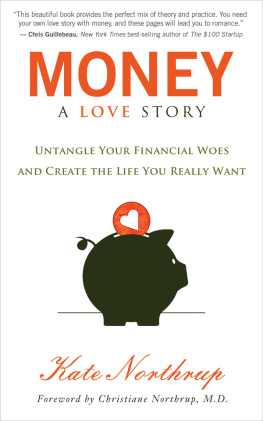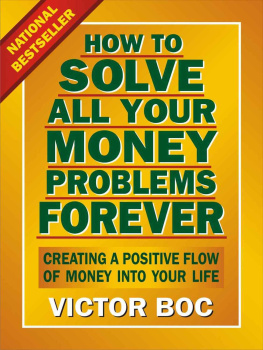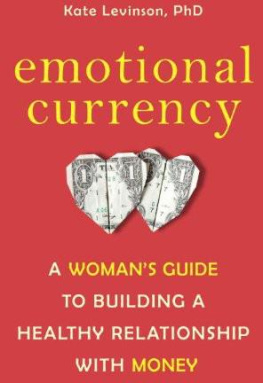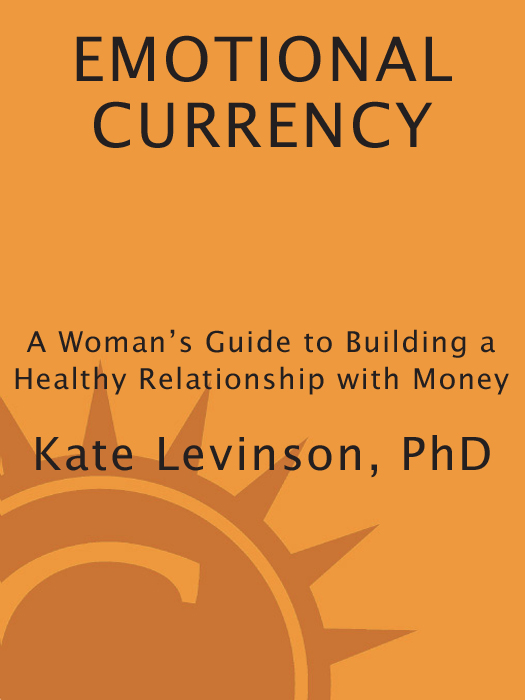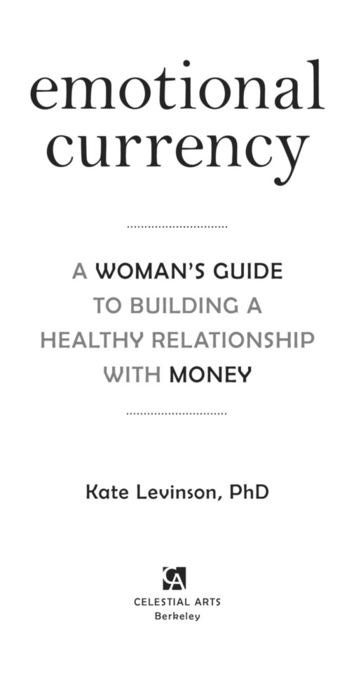Copyright 2011 by Kate Levinson, PhD
All rights reserved.
Published in the United States by Celestial Arts, an imprint of
the Crown Publishing Group, a division of Random House, Inc., New York.
www.crownpublishing.com
www.tenspeed.com
Celestial Arts and the Celestial Arts colophon are
registered trademarks of Random House, Inc.
Library of Congress Cataloging-in-Publication Data
Levinson, Kate.
Emotional currency : a womans guide to building a healthy relationship
with money / Kate Levinson.
p. cm.
1. WomenFinance, PersonalPsychological aspects. 2. Money
Psychological aspects. 3. Finance, PersonalPsychological aspects.
4. WomenFinance, Personal. I. Title.
HG179.L472 2010
332.0240082dc22
2010020566
eISBN: 978-1-58761-366-1
v3.1_r1
This book is dedicated to my mother, Bobette Eckstein Levinson,
and my mother-in-law, Mildred Maloof Costa
two women whose lives were so different, financially and otherwise,
but who shared the same openhearted generosity.
ACKNOWLEDGMENTS

I owe a large debt of gratitude to the many people who have taught me about money: my family, my friends, my clients, the women I interviewed for the book, and the women who have attended the Emotional Currency Workshops.
My thanks to Philip Fradkin for his introduction to Carl Brandt, who read my proposal and suggested it to Gail Hochman, his partner at Brandt & Hochman Literary Agents. Gail guided me so wisely through several edits and, in a moment of intense doubt, reassured me by telling me one of her money stories. More than any other words could have, her story showed me that there was value in the idea of this book. Gratitude to Marci Adamski for making the introduction to Julie Bennett, the acquisitions editor at Ten Speed Press, and to Julie who got the book. And my thanks to Veronica Randall, senior editor at Ten Speed, for carrying us steadily, the book and me, through the home stretch. Special thanks to Nancy Park for coming up with the name of Emotional Currency for my workshops which became the title to this book.
Many friends and professional editors, over lots of years, have made their marks on the chaos of words and ideas that has now become Emotional Currency. I thank them all, especially Francine Allen, Wendy Earl, Kathryn Frank, Catherine Lucas, Doris Ober, Rachel Remen, Jane Reynolds, Linda Spangler, and Margaret Wrinkle. I am especially indebted to Nancy Addess and Jean Blomquist, editors on the last drafts of the book, who continually asked for clarification, rewording, and reorganization. I truly couldnt have made it without all of you!
And to my beloved husband, Steve Costa, my gratitude for all that he has brought into my life. It was a very good thing that Id discovered that money was emotional currency before he had the idea of buying Point Reyes Books. Without having done some of my inner money work, I would certainly have said, We cant! We dont have the money. And our lives would have been poorer. Instead, our world has been immeasurably expanded and enriched, but of even more value to me has been the deepening of our partnership.
I now have the privilege of being both an author and a bookseller. I thank the independent booksellers for continuing, against all odds, to be a vital part of bookselling in America. I know that this book would never have been published without their existence.
CONTENTS

PART ONE:
UNDERSTANDING MONEY

PART TWO:
EXPLORING YOUR EMOTIONS AROUND MONEY

PART THREE:
TRANSFORMING YOUR RELATIONSHIP WITH MONEY

Being clueless about money is no longer affordable.
INTRODUCTION:
Getting Started

F OR MOST OF MY LIFE , I thought money was just the tangible thing that we dealt with every day: cash, coin, check, and credit card. I wasnt supposed to have feelings about it, and when I did, I quickly pushed them aside. I took pride that I didnt let money dominate my lifeas it did my fathersand I thought that my only dilemmas with money had to do with my not having enough of it and not being good with numbers.
Occasionally, I would try to educate myself about finances and pay attention to my money. I failed at each new approach to bill paying, record keeping, budgeting, investing, and saving. I spent years listening to the wrong people for financial advice and making poor financial decisions. All of these experiences reinforced my idea that I didnt do money, meaning I was only good at making it disappear, either by spending it or making bad investment decisions. I was a woman, after all, and for generations women have been told that they are not capable of managing money well. I was only too glad to buy into this stereotype.
We live in a culture that until very recently thought womens financial place was to be dependent on men. It taught, and often legally required, women to rely on their fathers, husbands, brothers, sons, and financial experts to handle their financial concerns. But for the past several decades, women in the United States have been entering new territory as we make, spend, save, invest, and manage money. Our financial management skills have not kept pace. It is abundantly clear, however, that relying solely on others to handle our money matters is not healthy; we need to develop our own skills and strengths in regard to money just as we have for decades in the workplace.
But doing money well goes beyond our need to learn traditional principles of money management and financial planning. We also need to understand and value the way we relate to money as women, and that includes our emotional relationship to it. Money in and of itself is not emotional. Its just a piece of paper after all, but its a piece of paper that can hold powerful psychological and emotional meaning. For most women, money is laden with feeling. Some emotions, especially when we dont attend to them, can present obstacles in our dealing with money, and some can make money a vital and useful entity in our lives.
BECOMING CONSCIOUS ABOUT MONEY
What seems unbelievable to me now is that, even though I was a practicing therapist and knew well about the power of working with emotions, the concept of thinking emotionally about money had never occurred to me. I assumed my discomfort with money was caused by the amount I had and how I mismanaged it, never glimpsing that most of my money dilemmas had to do with my feelings and what it meant to me, as I had always had enough to cover basic expenses.


